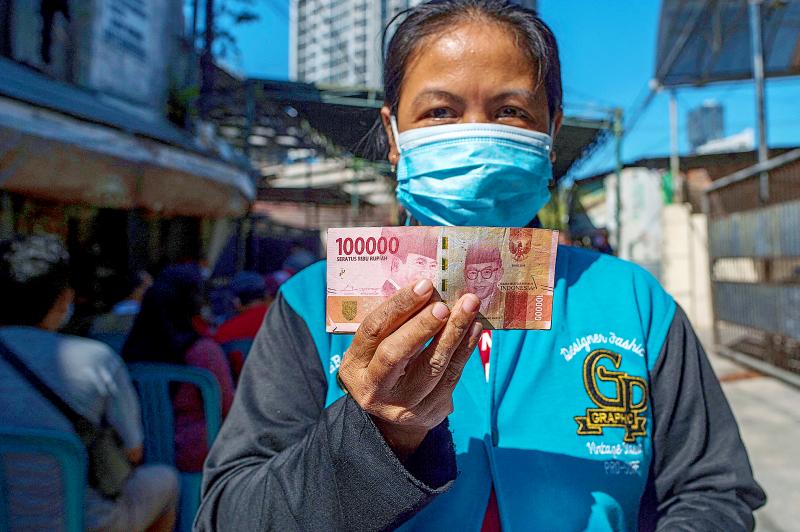The Indonesian rupiah could be Asia’s best-performing currency for the rest of this year, with elevated commodity prices boosting the nation’s trade surpluses.
The exporter of coal and palm oil is benefiting from a global energy crisis that has roiled many of its peers that are net commodity importers.
Indonesia is due to post last month’s trade figures on Friday, following a record US$4.74 billion surplus in August — its 16th in a row.

Photo: AFP
The rupiah rose 1.3 percent in the third quarter, even as Asian rivals weakened with rising US Treasury yields. With the nation’s foreign reserves at a record, Bank Indonesia has plenty of ammunition to support the currency if US yields rise further in coming months.
“We continue to lean positively on the IDR and expect it to remain one of the best performers across EM [emerging markets] Asia on a total-returns basis in Q4,” said Divya Devesh, head of ASEAN and South Asia FX research at Standard Chartered Bank in Singapore.
He said that Indonesia was in a better position than before the 2013 taper tantrum, with a combined current account trade surplus of US$13 billion in the past four quarters, compared with a US$12 billion deficit eight years ago.
There are threats to the rupiah’s bid to remain at, or near the top, of Asia’s leadership board this quarter after topping it in the three months ended last month.
The currency’s inability to breach a technical resistance at 14,200 against the US dollar last month despite all the bullish momentum could limit more gains.
Continued increases in Treasury yields could also weigh on the attractiveness of the rupiah’s trade.
Foreign funds have sold the nation’s debt for 13 consecutive days through Tuesday last week on a net basis.
However, many of the rupiah’s regional rivals are facing even bigger headwinds.
The baht has been dragged down by Thailand’s slowing economy and a growing current account deficit, while the Philippine central bank has signaled that the peso could weaken more this quarter.
Meanwhile, the Singaporean dollar’s upside might be limited if the Monetary Authority of Singapore leaves its policy parameters unchanged at its upcoming policy review, as is widely expected.
The Malaysian currency is the one outlier that could knock the rupiah off its perch. A high vaccination rate enabling authorities to roll back curbs and surging oil prices are buoying Malaysia’s growth.

Taiwan Semiconductor Manufacturing Co (TSMC, 台積電) yesterday said that its investment plan in Arizona is going according to schedule, following a local media report claiming that the company is planning to break ground on its third wafer fab in the US in June. In a statement, TSMC said it does not comment on market speculation, but that its investments in Arizona are proceeding well. TSMC is investing more than US$65 billion in Arizona to build three advanced wafer fabs. The first one has started production using the 4-nanometer (nm) process, while the second one would start mass production using the

‘SILVER LINING’: Although the news caused TSMC to fall on the local market, an analyst said that as tariffs are not set to go into effect until April, there is still time for negotiations US President Donald Trump on Tuesday said that he would likely impose tariffs on semiconductor, automobile and pharmaceutical imports of about 25 percent, with an announcement coming as soon as April 2 in a move that would represent a dramatic widening of the US leader’s trade war. “I probably will tell you that on April 2, but it’ll be in the neighborhood of 25 percent,” Trump told reporters at his Mar-a-Lago club when asked about his plan for auto tariffs. Asked about similar levies on pharmaceutical drugs and semiconductors, the president said that “it’ll be 25 percent and higher, and it’ll

When an apartment comes up for rent in Germany’s big cities, hundreds of prospective tenants often queue down the street to view it, but the acute shortage of affordable housing is getting scant attention ahead of today’s snap general election. “Housing is one of the main problems for people, but nobody talks about it, nobody takes it seriously,” said Andreas Ibel, president of Build Europe, an association representing housing developers. Migration and the sluggish economy top the list of voters’ concerns, but analysts say housing policy fails to break through as returns on investment take time to register, making the

CHIP BOOM: Revenue for the semiconductor industry is set to reach US$1 trillion by 2032, opening up opportunities for the chip pacakging and testing company, it said ASE Technology Holding Co (日月光投控), the world’s largest provider of outsourced semiconductor assembly and test (OSAT) services, yesterday launched a new advanced manufacturing facility in Penang, Malaysia, aiming to meet growing demand for emerging technologies such as generative artificial intelligence (AI) applications. The US$300 million facility is a critical step in expanding ASE’s global footprint, offering an alternative for customers from the US, Europe, Japan, South Korea and China to assemble and test chips outside of Taiwan amid efforts to diversify supply chains. The plant, the company’s fifth in Malaysia, is part of a strategic expansion plan that would more than triple